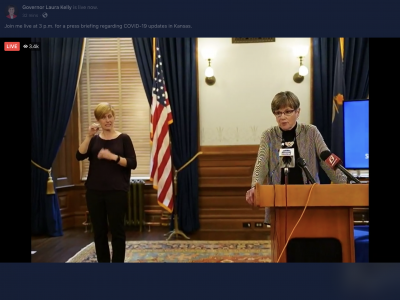Kelly vetoes legislation limiting her emergency powers, calls lawmakers to June 3 special session

photo by: Office of the Governor/Screenshot
Kansas Gov. Laura Kelly speaks at a COVID-19 news conference on Monday, May 26, 2020 at the Kansas Statehouse in Topeka.
Updated at 7:25 p.m. Tuesday
Less than a week after the Kansas Legislature passed sweeping legislation limiting Democratic Gov. Laura Kelly’s powers to manage the COVID-19 pandemic, Kelly announced Tuesday that she had “no choice” but to veto the bill.
What legislators passed last week, Kelly said, would have “long-standing consequences for the people of Kansas.” While saying she supports certain parts of the bill, Kelly concluded it causes more problems than it solves — and ultimately limits the state in its ability to respond “aggressively” to the pandemic.
Kelly also said she has “grave concerns” about the constitutionality of the bill, as both Republican and Democratic lawmakers had been told by legal counsel that all legislative work had to be completed by midnight on May 21. The bill reworking the state’s Emergency Management Act was passed after 8 a.m. on May 22.
Because state lawmakers adjourned the legislative session on May 22, they do not have the ability to override Kelly’s veto. A special session of the legislature functions independently of anything that happened in that year’s session.
The bill passed in an overnight session by the Kansas Legislature was meant to shield businesses and health care providers from coronavirus-related lawsuits and take control of the state’s pandemic response from Kelly, including decisions about how to spend $1.25 billion in federal relief funds from the March CARES Act stimulus. Of particular concern to Kelly, though, was that it also limited local health officials’ ability to respond to the crisis — a policy Kelly called “unconscionable”.
The vetoed bill also would have extended the state’s emergency disaster declaration through May 31. As a result of Kelly’s veto, that declaration now expires at midnight Tuesday.
Kelly’s plan to gradually reopen the state economy through a series of executive orders also expires with the current state of emergency declaration. Going forward, counties in the state will have the option to comply with the plan or issue their own local orders, rather than following executive orders from the governor’s office.
In other words, Kelly’s veto takes the power to manage the reopening process out of her hands and places it in the hands of local officials — a frequent request of Republican legislative leaders during the initial stages of the pandemic.
Now, that decision of whether to comply with that plan, or speed up the reopening process, is up to each of Kansas’ individual 105 county health departments.
Douglas County’s Unified Command has agreed to adopt Kelly’s Phase Two in a local health order, according to a Tuesday night press release from Lawrence-Douglas County Public Health. Phase Two limits gatherings to 15 people and requires some at-risk businesses to stay closed.
The local health order, issued by Douglas County Health Officer Dr. Thomas Marcellino, will take effect at 12:01 a.m. Wednesday.
“This gives people of Douglas County the message that we’re going to stick with the current public health measures to guard against the spread of COVID-19 as part of a phased reopening, and we think it’s a good plan that is working in our area,” Marcellino said in the release.
Phase Three of the Ad Astra plan, scheduled to begin June 8, would have expanded the gathering limit to 45 people and allowed nearly all activities and businesses to open as long as they practiced social distancing. Douglas County’s leaders will release any restrictions for Phase 3 under a local health order before June 8, the Tuesday night release noted.
Kelly said Tuesday that she would be forced to issue a new state of emergency declaration, with focus shifted to the state’s economic recovery from the COVID-19 pandemic. Not doing so would cut off Kansas’ ability to receive any further federal funding related to the crisis, as states must be in a declared state of emergency.
Because state statute makes it difficult for a Kansas governor to continue reissuing states of emergency for the same disaster, Kelly’s new declaration must focus on the economic disaster brought on by the COVID-19 pandemic.
This allows Kansas to continue receiving federal funds, and allows some executive orders to be continued under the new state of emergency declaration, which Kelly’s office said she signed Tuesday.
Finally, Kelly announced that as a result of the new state of emergency, she would call back legislators to the Capitol for a special session on June 3, with the sole focus of further extending Kansas’ state of emergency.
The new emergency declaration lasts only 15 days, and if the legislature doesn’t extend it further, Kansas’ ability to respond at all to the COVID-19 crisis will be put at risk, Kelly said.
“The (Legislature’s) process was messy, confusing and complicated. But it didn’t have to be,” Kelly said. “There are those who will see the actions of the Legislature, and my actions, as solely about power — who has it and who wants it. But this is not about power; it is about leadership.”
“Being a leader means being willing to do what’s difficult and even unpopular. It means standing up for what’s right and not being bullied into taking action that would be disastrous to the people of Kansas,” she said. “That will always be my top priority.”
— The Associated Press contributed to this story.







COMMENTS